|
A long, long
time ago, Humanity and Nature became sworn comrades
and signed a non-aggression treaty. But soon, the humans
who had pledged never to invade their ally realized
that without Nature's offerings, they could not survive.
Cautiously, they started to clear the land and cut trees,
and then began to sow and harvest. Would Nature be angry
at their actions and punish them? The Naxi people devised
ceremonies to appease Nature. During the ceremonies,
the humans apologized to Nature, so as to maintain the
initial pact of peace.
- Naxi legend
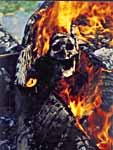
This story, told to 44-year-old filmmaker
Zhang Xu by a dongba (Naxi shaman), elucidates the ethnic
group's intimate connection to nature. Zhang believes
this bond is what accounts for the tranquility of the
Naxi (pronounced na-shee) people in the face of great
adversity.
The First Journey
In 1990, Zhang, a Beijing native, embarked on a five-month
journey that would forever change her life. She traveled
to southwest China's Yunnan province to interview and
research the Naxi people, living with them in the mountain
redoubt of Lijiang for almost half a year.
Zhang was enchanted by the natural
scenery surrounding Lijiang - the snowcapped Dragon
Jade Mountain, the cold and crystal clear Lugu Lake,
the dramatic Tiger Leaping Gorge at the source of the
Yangtze River. Zhang felt an instant connection to the
unique customs of the Dongba religion and culture, in
particular the altruistic relationship between humans
and nature, a pact which has been maintained for centuries,
through ceremonies and sacred rituals.

Shaman Culture
Living with the Naxi people, Zhang became fascinated
with the Dongba culture and religion. The Naxis are
the descendants of an ancient nomadic people known as
the Shiqiang who centuries ago gave up their nomadic
wandering and settled in the Lijiang valley. In ancient
times these settlers were known by the names of Moxie
or Mosha. In 1949, with the establishment of the People's
Republic of China, they took the name of Naxi.
Their traditional religion is polytheistic
and influenced by Shamanism, Taoism and Buddhism. The
Naxi believe that all works of nature have souls, including
heaven and earth, the sun and moon, mountains and rivers,
clouds and wind. Their religious leaders, dongbas, preside
over rituals including the worship of gods and ancestors.
They conduct funerals, divinations, rites, and celebrations,
and are called upon to cure the sick and expel ghosts.
Dongba shamans are also well-versed in medicine, literature,
arts and crafts, and have the crucial responsibility
of passing on the traditions of the Naxi culture to
future generations. Dongbas are not granted special
privileges among their fellow villagers, and have traditionally
earned their living by farming.
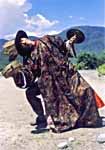
Preserving a Threatened Culture
Over the past half-century, the Naxi people have gone
from a thriving culture with a heavy emphasis on sacred
rituals, to one in an increasingly precarious position
as the practice of traditions begins to fall victim
to modernization.
Zhang, producer and director for
the Beijing Television Art Center, turned to her profession
several years ago to help raise awareness of the situation.
In 1992 she wrote and directed the television documentary
The Mystical Dongba Culture, which aired throughout
China and internationally. Then, in 1996 she prepared
the screenplay and stage design for the Dongba dance-drama
Third Kingdom of Jade Dragon Mountain, which was performed
in Hong Kong. Late last year, she traveled to Lijiang
to shoot footage for a documentary on traditional Naxi
rituals.
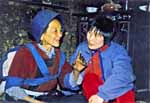
"Time is running out. The civilization
and its traditions are dying out," says a determined
Zhang, sitting in her Beijing apartment on a recent
winter night. "Even today, a decade later, I am still
one of the only people doing this important work."
Zhang's home is filled with Naxi
pictograph woodcut scriptures, and framed Egyptian hieroglyphs
cover the walls. Her bookshelves are filled with magazines,
hardbound scholarly studies, and videotapes of past
and current projects.
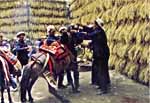
Upon graduating from the Beijing
Broadcasting Institute in 1983, Zhang found herself
restless and bored with city life. "There was little
contemporary culture. I was searching for something
new," she says wistfully. Zhang's first post-graduation
project was to adapt and direct the television drama
Lost In The Trees, a series about city youth on south
China's Hainan Island during the (1966-76) Cultural
Revolution. The series won a national television award.
To Zhang's great consternation, the
Dongba culture is dying out. According to scholars,
there are less than 100 practicing dongbas left. As
a result, traditional ceremonies are not held as regularly
as they once were. In addition to working to save the
Dongba culture, advocates like Zhang have been persuading
the government to teach the native Naxi language in
primary schools in Lijiang County. Supporters argue
that Naxi language-based education will help instill
a sense of pride in the culture.

The Naxi population in Yunnan hovers
around 280,000 people. The traditional dongba training
is passed down from generation to generation. The training
includes translating Dongba scriptures based on the
Naxi language, the world's only surviving pictographic
language still in use today.
Problems facing the Naxi are as much
internal as they are external, Zhang observes. One challenge
lies in maintaining the Dongba family structure, which
has traditionally been of paramount importance. Another
is in persuading dongba shamans to pass on their teachings.
"Few people consider it their obligation to preserve
the Dongba culture," Zhang laments. "The new generation
in Lijiang doesn't care about culture - they are more
interested in material pursuits."
Lack of financial support and poor
economic conditions is also a serious problem facing
the Naxi people, Zhang adds, despite the interest in
Lijiang shown by foreign organizations. "Outsiders are
willing to visit Lijiang as tourists, but are not interested
in helping its people," Zhang says. Little respite is
offered by the growth in tourism and commerce that Lijiang
has experienced in recent years. In fact, the fear is
that this will be the culture's downfall, undermining
the sacred, legendary treaty made long ago between humanity
and nature.
Daughter of the Dongba
For Zhang, cultural preservation is not only a matter
of spirituality and consciousness, but also of family
values. In 1990, Zhang attended a religious ceremony,
presided over by the shaman He Xuezeng, in which a deceased
elderly woman was having her soul released from purgatory.
The open embrace of the mountains surrounding the village,
the soft caress of the wind, the old dongba's face filled
with rivulets of wrinkles chanting sacred scriptures
during the ceremonies was an epiphany.
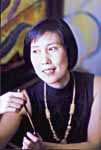
Zhang felt an instant affinity, not
only to the culture but for the old sage as well. Upon
visiting He's house and spending time with him and his
wife for the first time, Zhang found herself enveloped
in a feeling of love and kinship infused with familiarity.
The gathering was further intensified when the wife
professed to Zhang: "How wonderful it would be if you
were my daughter." To that, the filmmaker responded
without hesitation, "I am your daughter." The certainty
in Zhang's voice moved the couple as they explained
that they had lost a daughter in childbirth many years
ago.
As a result of her work, the Naxi
people gave Zhang the name Tayou Lamu, after a Naxi
goddess. According to legend, Tayou Lamu is responsible
for saving the souls of all those who are unable to
get into heaven. Zhang has taken the responsibility
attached to her name to heart, becoming an ardent advocate
of Naxi culture and working to keep the Dongba tradition
alive. "You have to commit your life to it to be successful,"
Zhang states with conviction.
On her most recent trip, she captured
striking footage of the ancient tradition of papermaking,
kept alive by the 72-year-old shaman He Zhiben (all
dongbas are given the surname He). He Zhiben is a master
of Dongba scriptures, as well as in charge of maintaining
and keeping alive the ancient craft of papermaking.
Zhang's new film, Traditional Naxi Papermaking, documents
the process used by He Zhiben and his son to make a
special type of acid-free paper used for recording Dongba
pictographic scriptures.
In the documentary, He Zhiben explains
the tradition to Zhang: "My family has been making paper
for three generations. My son is the fourth generation,
and my grandson is the fifth," he says. "Here's some
of our paper. I made this. This was made by my uncle.
It's over a hundred years old. This scripture is probably
over a hundred years old."
He talks and points to an old worn
and weathered book, the single surviving Dongba almanac
in his village. The book fell behind his bookcase during
the Cultural Revolution and was thus spared destruction.
He and his son use this old scripture book as a reference.
Taking a sheet and shaking it in the wind, He proudly
says of his paper, "This is really good quality. It
sounds like a new hundred yuan bill, the way it crackles.
It's the best there is."
Muse's Touch
Zhang began studying painting in the early 1990s under
the tutelage of Zhang Chunhe (no relation), founder
of the Contemporary Dongba School of Religious Painting
in Yunnan. At this point, Zhang had no formal art training.
In just a year she became a professional artist, holding
her first exhibition in Germany in 1993. Since then
Zhang has exhibited at the Mexican and Romanian embassies
in Beijing, among other places.
Zhang's paintings combine elements
of Dongba pictographs, myth, and contemporary aesthetics.
Considered Modern Dongba painting, a relatively new
style begun by contemporary Naxi artists, her pieces
are abstract in content and infused with vibrant colors
used to represent the harmony between gods, humanity
and nature. Her piece, The Relationship of Lives, is
conceived as a triptych, each part telling stories in
pictographic forms: two birds entwined at the neck looking
in opposite directions, the yellow head and neck of
an animal coming out of the mouth of another symbolizing
birth, and musical notes representing harmony.
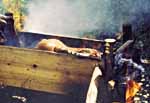
Creating Awareness
Zhang's relentless pursuit to keep the dongba culture
alive does not stop at documentation and her own art.
In 1996, she set up the Beijing Association of Dongba
Culture and Arts, to preserve the Dongba heritage and
promote wider appreciation of Dongba culture, arts and
traditions. Since its inception, the association has
organized a series of acclaimed exhibitions of rare
cultural objects, photos, documentaries, and works of
art that have toured China and abroad. The Beijing Association
of Dongba Culture and Arts strives to unite people from
all walks of life interested in Dongba culture to support
and join in the association's efforts.
Although fundraising ranks among
the group's priorities, Zhang has been financing most
of the activities, including her own documentaries in
Yunnan, out of her own pocket. Zhang says while she
could spend her energy now raising money for projects,
knowing how few dongba shamans remain, the dutiful adopted
daughter of the Naxis sees her work as a race against
time.
"We have to do this," Zhang states
simply. "These traditions are too important to be lost."
Zhang Xu is president of the Beijing
Association of Dongba Culture and Arts. For more information,
call 8425-1108, fax 6835-1189, or email dongba@public.bta.net.cn
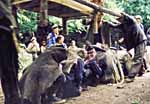
Imposters in Paradise
LIJIANG, Yunnan - For years the Naxi
minorities of this small city in northern Yunnan province
worried about losing their traditional culture to Han
Chinese. But few expected the Han to actually imitate
Naxis, a troubling trend in Lijiang's tourism sector.
It started when tourists began complaining
about the authenticity of Han Chinese guides dressed
in Naxi ethnic clothing. In turn, guides began saying
they were Naxi. It's an ironic twist - the dominant
Han Chinese pretending they belong to an ethnic minority.
But in today's China, money is a powerful motivator.
Lijiang, long popular with backpackers, is increasingly
a must-see for foreign tour groups. The demand for English-speaking
guides exceeds the supply,
prompting recent college grads of
nearby cities Kunming and Panzhihua to flood Lijiang's
tourism industry each year. Since agencies pay their
guides less than RMB300 a month, the key is to entertain
guests by singing and telling local legends thus reaping
riches in tips. And of course, actually being Naxi doesn't
hurt.
Huang Zhenqing, a Han guide from
Panzhihua, regularly tells guests she is Naxi. "What
does it matter if I tell them I'm Naxi?" she says. "The
guests are happy. They give me tips, so I'm happy."
Of the current 1,500 tour guides,
200 (and growing) are from outside Lijiang. At Guanfang
Hotel, Lijiang's only five-star hotel, many attendants
wearing Naxi dress aren't even from this part of China.
The hotel has an internship agreement with a tourism
school in Liaoning province. The job does not require
English skills, which means plenty of Naxi could do
the job just as well. One of the hotel's assistant managers
explains with candor: "Perhaps the guests would not
like it here as much if the girls were Naxi. The Naxi
have dark skin and they don't smile like the girls from
Liaoning. We want to give our guests a good feeling
when they stay here."
|











